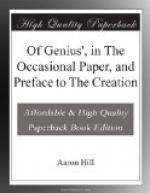Upon Consideration we find this Difference of Tempers to arise from Providence, and the Law of the Creation, and to be most Evident in al Irrational, and Inanimat Beings ... One Man is no more design’d for Al Arts, than Al Arts for One Man. We are born Confaederats, mutually to help One another, therefor appropriated in the Body Politic, to this, or that Busyness, as our Members are in the Natural to perform their separat Offices.
This same comparison between the body politic and the body human occurs in the essay of 1719, and even the author’s chief analogy drawn from musical harmony bears with it some of the flavor of an older system of universal correspondences. His comparison of the force of genius to the pull of gravity, however, evokes a newer picture. Yet it is a picture no less orderly and one from which the preordained function of each individual could be just as logically derived. And his rhapsodic praise of the infinite diversity of human temperaments is based on that favorite comparison with natural scenery and that familiar canon of neoclassical esthetics: ordered variety within unity, whether it be in nature or in art.
The author of the pamphlet of 1719 introduces another refinement on the idea of an inborn bent or genius. A man is born not only with a peculiar aptitude for the vocation of writing, but with a peculiar aptitude for a particular style of writing. Some such aptitude had presumably resulted in that individuality of style, that particular “character,” which 17th-century Biblical critics were busily searching out in each of the writers of Scripture.
Individuality or originality in the form or plan of a work of art, however, was quite another thing, and praise of it far more rare. Yet there had always been protests against the imposition of a universal classical standard, and our author’s insistence that some few geniuses have the right to discard the “Rules of Art” and all such “Leading-strings” follows a well-worn path of reasoning. His scientific analogy, drawn from those natural philosophers who had cast off the yoke of Aristotle and all “other Mens Light,” is one which had appeared at least as early as 1661 in Robert Boyle’s Considerations Touching the Style of Holy Scripture. It had been reiterated by Dryden and several others who refused to recognize an ipse dixit in letters any more than in science.
It must be noted, however, that this rejection of authority for a few rare individuals in no way constitutes a rejection of reason or conscious art. The genius has the right to cast off the fetters only after he has well studied them. Only in one instance does our author waver toward another conception. This is when he pauses to echo Rowe’s preface to Shakespeare and Addison’s famous Spectator no. 160. Then indeed he boasts that England has had many “Originals” who, “without the help of Learning, by the meer Force of natural




